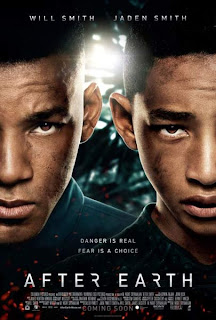There's no dispute that M. Night Shyamalan has become the favorite whipping-boy of critics and fairweather fans alike, beginning almost ten years ago with his 19th century tale, The Village. The grumblings that began with that film have only amplified over the years, culminating in the director being awarded Golden Raspberries for his work on The Last Airbender. It's gotten so bad, After Earth is the first film I've seen where I can't decide whether the decision to place all the credits at the end is an artistic decision, or one of self-preservation. The director's bad press has even provoked continued astonishment that his films are even able to be funded. And it doesn't seem like After Earth is going to change that any. Overnight the film plummetted to just barely double digits on Rotten Tomatoes, echoing the prevailing sentiments prior to its release, about how atrocious it would be.
But is it as bad as people are saying? Not hardly. After Earth is an extremely competent, allegorical tale with basically only two actors, which smartly exploits the grandiosity of the sci-fi genre to effect its modest goal of bringing a father and son closer together, perhaps in real life and in story. Artists have been mining science fiction since the very first recorded work of literature as a backdrop upon which to frame tales of the human condtion. It works because of its limitless possibilities, a perfect environment for small stories, rooted in our attraction to the harmony of opposities, and After Earth takes full advantage of this.
1000 years in the future, Earth has become unihabitable by mankind. Due to our irresponsible actions and ruthless pillaging of Earth's resources everything on the planet has evolved into a killing machine, creating a hostile environment. Even the air cannot really be breathed anymore. It's a fascinating concept, and one that almost seems a continuation of the themes explored in the director's villified film, The Happening, a fact that in this critic's eyes commands utmost respect. It's like a giant middle-finger to all that film's detractors, very rare in a Hollywood where the reaction to one's last film tends to dictate the next. The premise of After Earth could certainly lead to any and all amount of special effects, a blockbuster-sized epic in a world where "MORE is more" is the preferred mantra. But for Shyamalan it is the environment upon which to tell his human story, the story of a father and son, separated emotionally by a past tragedy, who crash land onto Earth, and must each overcome their personal obstacles when the son has to journey across the vicious terrain to reach the tail end of the craft and retrieve a distress beacon before a critical injury takes the father's life.
After Earth also appears to be dragged through the mud for its acting, mostly on the part of Jaden Smith, Will's real life son. Some of the reviews I have read even seek to blame the acting on Shyamalan. The truth is, holding the acting in this film up to the standards of typical films is to miss the point. For me, the fact that this is a real life father and son is an inescapable and heavily relied-upon reality that helps to massage the rough edges of Jaden's acting. This is a character wracked with fear and completely immature. It would not have been in the film's best interests to coax an Oscar-worthy performance out of Jaden. I'm not sure at this point in his career it's even possible, and I would argue that replacing him with a better actor would cause the film to lose more in underlying cohesion than it would gain in credibility.
Those who criticize this film for being a vanity project, or being just about a father and son, or for not much happening have also missed the point, and appear ignorant of the larger tradition at work underneath the surface. I posit, that had this come from any other director, more people would be singing its praises, but under Shyamalan's care it is naturally assumed bad and then picked apart for no other reason then to support that assumption. There is no trick ending. So get that out of your head right from the start. Sorry if you think that is a spoiler, it's not; but rather a notion long since overdue that audiences be disabused of. At ninety-minutes, the film is over pretty quick, and when it is the audience is definitely in a different place than they were at the start. After Earth is a capable and confidently executed story that works as both a science fiction parable and a feel-good family film. It is worth seeing and worth more to ponder about afterwards. Whether you spend that time lamenting missed opportunities or reliving the experience was probably telegraphed by your feelings on the film's director before you even sat down in the theatre.
**** out of ***** stars


No comments:
Post a Comment